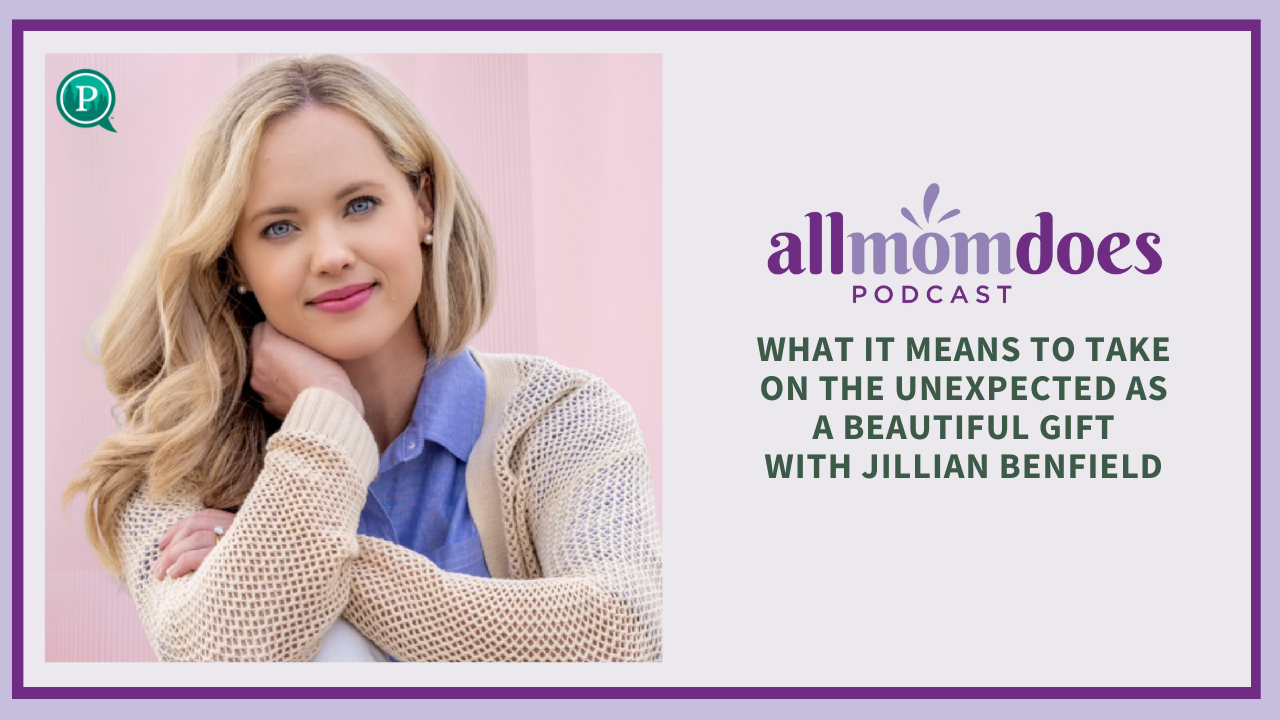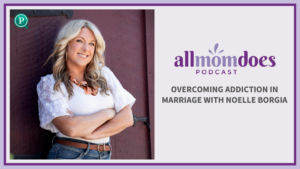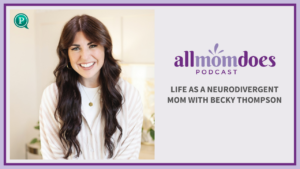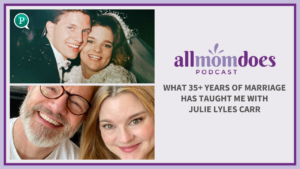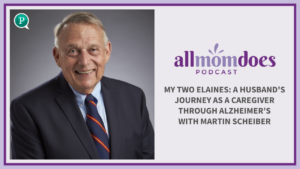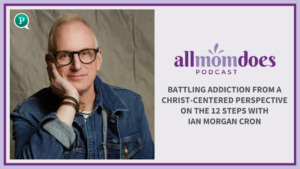With a career in television and a growing family, Jillian Benfield’s goals were on track. But when the unexpected happened, it was more than just her circumstances that changed. Jillian joins The AllMomDoes Podcast Julie Lyles Carr for this insightful conversation about what it means to take on the unexpected as a beautiful gift.
Show Notes:
Find Julie: Online | Instagram | Facebook | Twitter | Pinterest
AllMomDoes: Instagram | Facebook | Twitter
Transcription:
Purposely your life, God’s purpose. Listen at onpurposely.com.
Julie Lyles Carr [00:00:15] Hey, friend. I got something in the mail that I was really excited about. It was a book. And when I began to look through this book and saw different features of it, I thought, “Oh, this is somebody I want to come on the show because I know my listener is going to want to hear from this person.” I’m Julie Lyle’s Carr, the host of the All Mom Does podcast. And today I have someone on. I actually went, I did it. I’m going to confess. I slid into her DMs. I got the book, and I was like, “How do I get in touch with this person?” Because I am so excited to hear what she has to say. I was like, “I’m going to do it. I’m just going to fangirl.” And I did. I got into the DMs and was able to get connected to her team. And so Jillian Benfield, thank you so much for being on the podcast today and thank you for letting me slide into your DMs.
Jillian [00:01:05] That just made me laugh out loud. Thank you for sliding into my DMs. I don’t think I’ve ever said that sentence before and I’m really happy to be here.
Julie Lyles Carr [00:01:13] I’m so glad to have you. Well, give my listener a little update on who you are, where you live in the country, a little bit of career background, all that kind of stuff.
Jillian [00:01:23] Yeah, my career background is I’m a former TV news anchor and reporter and my husband was graduated dental school in 2013 and the Air Force paid for his dental tuition. And so once we were done with dental school in 2013, they moved us across the country to Las Vegas, Nevada. And we lived in, I think, eight different states. Is that right? I’m going to get this wrong. We’ve lived in eight different states together in a very short amount of time. No, I’m sorry. It was five different states in eight years. I don’t remember the numbers. We’ve lived in a lot of places.
Julie Lyles Carr [00:01:59] It’s a lot. No matter what. It’s a lot.
Jillian [00:02:02] It’s a lot. So anyways, now we are finally settled on the space coast of Florida and my husband’s in private practice and out of active duty military. And so this, this year has been a big transition for us.
Julie Lyles Carr [00:02:16] Right, Right. We followed the military when I was a kid because my dad was with the space shuttle program. And so we ended up even though we weren’t military, we always lived close to airforce bases because that was a lot of times where you had different pilots and test pilots and all that kind of stuff. And so that resonates with me. That’s moving from place to place. And of course, now one of my daughters has married a guy who’s in the Marines. So they are getting to experience your lifestyle a little bit. And that constant uncertainty of where are we going to go next week? I don’t know. So that is hats off, because that is a really interesting way to start a marriage and a whole lot of moves to make. No wonder the numbers get a little fuzzy somewhere in there. And in all of that, you also had a career in media. So how did all of that work together?
Jillian [00:03:02] Yeah. So I’ll just kind of take you back to 2013. So again, I was a news anchor and reporter in 2013. I had just had my first child and that’s when the military moved us. And it was only an 11 month assignment in Las Vegas. And so I thought it was the perfect time to take off. And then I thought I would go back to TV news once we got our next assignment. Well, then May 8th, 2014 rolled around and I got a phone call from my husband and he says, “We got Holloman Air Force Base.” Now, I had studied this list pretty extensively. I can probably still to this day name you 90% of the Air Force bases around the world. And this base was not even ringing the slightest of bells. And I said, “Andy, where is that?” And he said, “Alamogordo, New Mexico.” So there’s not even a Target in Alamogordo, New Mexico, let alone a TV news station. So I was devastated. I think a lot of moms can relate to that, right? This identity piece with your career and how that can change when you become a mother or become a military spouse or whatever, what have you. Well, then that same day, later in the day, I had this little whisper in my head to take a pregnancy test. And we were not trying. Our daughter had just turned a year old and it was positive. And so I thought, “Okay, God, okay, you want me to be stay at home mom, I get it. Okay.” I thought I had it all figured out.
Julie Lyles Carr [00:04:43] Figured out?
Jillian [00:04:44] Yeah, right. And so. Yeah. And then we got to Alamogordo two months later and had my 20 week ultrasound, and then my life started going down a very unexpected path from there.
Julie Lyles Carr [00:05:00] The book that I got in the mail is this beautiful cover, and the title is “The Gift of the Unexpected.” Jillian, part of what really propelled me to seek you out was so often in our lives, I think that we see information or we get ideas on when something unexpected happens. Here’s how you survive. Here’s how you dig in. Here’s the things that you do to try to take care of yourself the way that you have titled this is such an interesting change of perspective. It’s such a powerful mindset to say in this unexpected, Where is the gift? For you is as a military spouse, that unexpected is happening all the time when it comes to these moves and what that’s going to mean and what that’s going to mean for your career. But that you also had happened on the same day, this pregnancy test. You weren’t expecting to turn positive, turned positive. And then you had some ultrasound results that were very unexpected. The power of now, these years later, you being able to take us as a guide and say these unexpected things, particularly in this pregnancy, can be seen as a gift is so incredible. So you have this ultrasound and it does not go the way one might hope. So what happened?
Jillian [00:06:14] Yeah. So the ultrasound tech, I noticed, was taking a really long time because I already had, you know, a very young child. So I had just gone through all of that. And finally she got her measurements and she thanked us, flipped on the lights. A nurse walked in the room and said, Well, everything must look great because the doctor’s not here. And as soon as she said those words, he walked in and he explained to us that there were several markers on the ultrasound that indicated that our child had a higher chance of having a trisomy. And I said, “Well, what does that mean?” And he says, “It means that your child has a higher chance of having a condition like Down’s syndrome.” And I just remember my back, like breaking out in fire and the words, “I can’t be a special needs mom. I can’t be a special needs mom” just going over and over again in my head like a skipping CD. Well, then we got some blood work done. And eight days later I get another phone call from my husband and he says, “The doctor called. It’s not good. I’m coming home.” And I just remember my heavy 21 week pregnant body just falling to the kitchen floor. I just said, “Oh, no, oh, no, oh, no, this doesn’t feel real. This doesn’t feel real.” And finally my husband walked in and I could tell he was going to be sick. And I started unbuttoning his very restricting military uniform. And he did get sick. And I remember him laying his head on my chest afterwards. And I just remember his hot tears rolling down my chest. And, you know, we had just turned 27 years old, both of us, and we just couldn’t believe that this happened to us. And we knew the test was positive for something life altering and possibly deadly. We did not know what at that point, and we had to go in to get the official results. And the doctor walks in and he said, “Well, it’s not good. Your child has a 99.9% chance of having Down’s syndrome and it’s normally at times like these people want to talk about their options.” I said, “What options?” He said, “Option one is you terminate the pregnancy.” And I said, “Well, what’s option two? “Means that option two is you continue the pregnancy with the high risk doctor.” He said, “But don’t worry. Don’t worry. You don’t have to be a hero. You if you decide not to go through the through with the termination, you can have the baby here and we can keep him comfortable. But we don’t have to do anything drastic to save his life.” So in other words, we could have our baby to keep our consciences clean. But we could let him die of natural causes. So the doctor believed that our child would have a life that was not worth living. So I grieved as if a death had taken place. But it would take me many weeks and months and possibly years to realize that I had way more in common with that doctor than I wanted to admit. And that’s a lot of what this book is about. It’s about unraveling that. It’s about the unlearning and the learning that can take place after the unexpected.
Julie Lyles Carr [00:09:38] I love this phrase of unlearning. And when I look at the verbiage and again, I think it sounds like this was a doctor who was trying to engage with you with compassion and with options and with trying to give you some sense of, look, we can get our hands back on the wheel here. It’s unexpected. Things happen. We’re going to we’re going to put some control back in your hands. What I think is really fascinating is that he started with the idea of I’m here with bad news. And went from there. And myself having two children who are differently abled. It is very interesting to observe the language, even this language of hero. You don’t have to be a hero. Or sometimes how we treat parents who have children, who are differently abled as if they are heroic for taking this on, for doing whatever. This is all a really interesting soup because, again, I know I know, Jillian, that before I watched some of the experience that I’ve now had, there were people I probably engaged with who have children who are differently abled. And I was using phrases and terms and sending emotion and, you know, heart emojis their way that now I recognize what was I doing that I got a lot to unlearn myself. Which is part of what I love about that word. I would love for you to address because maybe the listener doesn’t know. When you and I talk about this soup of all of these kinds of responses from people, what we’re really talking about to some degree is something that now has been categorized and I like this word is ableism. So how do you see ableism when you think about the pregnancy? You think about this doctor. You think about your own heart when it came to receiving this kind of unexpected news.
Jillian [00:11:22] Yeah. So ableism is the idea that disability is inherently inferior and is something that needs to be fixed. And so that was absolutely my attitude about disability. But at this time, whether I knew it or not, it 100% was the truth. It clearly was the doctors belief as well. Like he believes that our child would not have a life like yours and mine, and therefore it must be less than. Which is just not true. And so that was a lot of the unlearning that had to take place, was realizing that. I grieved as hard as I did because I believed my own worth was attached to my resume. I believed my worth was attached to my outcome. So if I had this child outside the realm of what most people would consider normal and who might not be able to achieve the things that we as a society put a high value on who may not be able to attend college and accumulate all of this wealth and get married then how could he live a worthy life? That was my attitude at the time. And so it would take me a long time to realize how bad my outlook on life was, how bad my outlook on worth was. And yeah, we could keep going on a deep dive on this, right? But, you know, a lot of it has to do with I believe, is that we are still a society that abides by separate but equal. We we automatically segregate kids with disabilities still to this day. Still to this day. Only 18% of students who are on an alternate curriculum who have intellectual disabilities. Only 18% of those in the United States are included in the general education classroom in high school. So I grew up not knowing anyone with disabilities because they were separated. And so there is a whole lot to unpack here. And I did this in the book, but it had to do with this very Americanized version of success and worth that I had to deconstruct a very Americanized version of the divine that I had to deconstruct, and this abelism that I was carrying with me, that I didn’t even know what it was, but it was very much present.
Julie Lyles Carr [00:14:13] We definitely encountered different issues when our first daughter was diagnosed with her hearing loss that I just didn’t see coming. I didn’t things that people would say, some of them well-meaning, some of them not, which is really a shock to me Jillian. I don’t know. I really was surprised sometimes there were the things that people would say that I think they were trying to be kind. And then there were things people would say that…It taps right into this just this marker of how we evaluate worth in our culture and how valuable we think normal is. And that I didn’t realize how embedded it was in myself until I was needing to advocate and push forward with my daughter. And then it was like, “Wow, why am I seeing this everywhere?” One of the experiences that I wrote about in my book, “Raising an Original,” was in a dance class that there was a family who did not want my daughter to be in their daughter’s dance class because they felt that she was going to reduce the efficacy of the performance. And Jillian, these kids were like three years old. I mean, like we were not talking Rockettes, right? You know, and so this stuff is everywhere. It is interesting sometimes that we can philosophically say, “Oh, we want to make room for everybody until we think it might interrupt our child’s classroom, our child’s extracurricular activity, our child’s church event, whatever.” It is so hard baked in. Now, fast forward for me. You walk through this grief process and it feels like a loss. It feels like the loss of a dream. It feels like the loss of what could be expected for this child. And then Anderson’s born. What happens then for you at that time?
Jillian [00:15:59] It was really a scene out of a movie because we had to move away from Alamogordo because of the lack of medical care, and we got restationed in Tucson, Arizona, where, you know, it’s a warm climate. And on that day I had told my husband that I really thought Anderson was going to be born on New Year’s Eve, even though my due date was two weeks later. And he said, “Why?” And I said, “I really think God’s going to show us a miracle on the last day of the worst year of our lives.” On December 31st, you know, the labor process started and so did this rare Arizona snow.
Julie Lyles Carr [00:16:42] Oh, wow.
Jillian [00:16:46] Anyways, he was born and I write in the book that it was a miracle. I just remember his eyes staring straight into me, straight through my soul, you know? And I just felt like there was this piece that washed over. And then he was taken to the NICU. You know, I started to see some of the evidence as that, you know, this was some of my fears were founded and some of them were not. I walked out of the NICU doors and I saw these big cacti topped with snow. And I just felt like the portrait of my life was staring back at me, that it was rare and harsh and also so very beautiful. And that has remained true. You know, there has been harshness that has come from Anderson’s disability, and it was important for me to include what came after his birth, you know, because I think that some books could have been like and then he was born and then everything was wonderful.
Julie Lyles Carr [00:18:03] We were all in love. And he just fit into family so beautifully and da da da da da da da da da.
Jillian [00:18:11] In that chapter though, I titled, “Becoming Real.” Because after he was born, there were so many medical things. As you know, when you get older, you get ushered into this brand new world and you have to become an expert in all of these different medical areas and advocacy areas. And oh, it took him 8 hours a day to eat, not including the pumping that I was doing. You know, it was a full time job just to feed him. And there was some real heartache there. I called it this aftershock. You know, I live on the space coast of Florida. Like you said, your dad was in the space shuttle program. And when when rockets reenter Earth, there’s this sonic boom. It’s this aftershock. I was living in one big sonic boom. You know, the shuttle had landed. It was rolling along the landing strip. And I was in this new place knowing not a single other person other than my husband. I became a medical mom overnight, had no time to make friends there. You know, everything was revolved around his medical needs. And I say that because there was peace the day he was born. And there was also this reality of him having these medical issues and all that came with that. And so I go back to that picture of the cacti with the snow, because it really was the picture of my life that was about to unfold. And still to this day is sometimes true.
Julie Lyles Carr [00:19:42] It is interesting. There is a romanticization and you touched on this when you talked about the doctor saying you don’t need to be a hero. There is a romanticization, I think, at times within the parenting observations, the way that people put on you in a sense that if you have a child come into your home who is differently abled, then there’s this romantic idea of it in some ways. There are those who push hard and push hard against it, as we talked about with culture and the sense of worth and what is a worthy life? What is a well-lived life? Then there is this other side which tries to tidy it up again really quickly and get really fast to, “Oh, what a beautiful lesson. Here it is, and it’s tied up with a bow.” So how has that been being willing now you’ve accepted this thing as a gift. You’ve had this mindset change. Anderson is now turning into a big kid and all the things. How does that now still play out for you? Because the story keeps going, right? I know with my girls there were things that we figured out that worked, and in their toddler years, we got this piece figured out and this was still really hard and on and on. But I am here to tell you that even though one of my girls is now an adult and I have one who is getting ready to test her driver’s license, and I’m like, “Wait, wow, we’re here already.” Each new season does bring some new things that as a parent, you again, you’re on a track that’s different than some of the other parents in your world. You are trying to have to improve and figure out new things or new challenges that come along. How has that been with Anderson, as you’ve continued to frame and think about how you want to show up as his mom and how you want to be there for him, even though you’re going to consistently probably live in a place of the unexpected from season to season?
Jillian [00:21:36] Yeah, So I talk about this in the 10th chapter of the book. It’s called, “An Abundant Life.” Basically what I believe is that God did not promised us a perfect life. He promises us an abundant one. I think even that word abundance gets romanticized as well. But really abundant life is a full life. How I end up framing what you’re talking about really, this one tool has reshaped how I think about parenting a child with disability and how I think about life in general honestly. And it’s the word “and.” I used to be a “but” user. So like parenting a child with a disability is really hard, but it’s really good. Yes. And when you use the word, “but” it negates those harsher parts of our realities, right? Now, I use the word, “and.” So something, what that would look like right now is, “Man, Anderson’s behavior is really hard right now, AND parenting him has been one of my absolute best gifts I’ve ever received.” Both of those things are true. When I am able to hold those things in both of my hands, I can see the darker shades and I can also see the brighter shades. And I can see that the whole of it is good. You know, I said this in that chapter that I feel like when I look at my life as a parent of a child with with a disability and you can insert this with anything, you can insert this as a just a mother or or whatever your unexpected thing is, right? I feel like it’s the color white, like not in the traditional literary sense where everything’s white and bright and lovely, but like, white holds all the colors, you know? And so my life with Anderson in particular, does have those deeper, darker shades. And it also has these bright and Harry shades. And the whole of it is so very beautiful. And that’s how I’m able to process the the harsher parts that can come with parenting a child with a disability in a world that’s not accessible.
Julie Lyles Carr [00:24:01] Jillian, how have you managed with your other children parenting them in conjunction with parenting Anderson? Part of why I ask this is at least in my world, with my girls, it was like everybody had to be all in. You know, I mean, whether my other kids thought this was convenient or not, they had to be all in in what we were doing. And there were a lot of elements of having siblings who were differently abled that I think in beautiful ways, colored my other kids worlds. The irony that I often feel happens that people don’t realize in the parenting journey is, yes, you may have a child with an identified disability, but your other kids all have special needs too. Like they all have things that they are grappling with and things that are a challenge and things that they’re great at and things that they’re not great at. So how are you in this journey with your children all still at home, growing in those early years? How is all of that working for you?
Jillian [00:25:01] I think it it does change depending on the season we’re in, for sure. You know, there was a time where when Anderson was much younger and my daughter, my oldest child, was, you know, not in school aged yet. And so she was drug around to therapies and all of these things she had to come with, you know, because I was a full time medical mom at this point. And so we would do things like take her out on one on one dates often and maybe put her in more extracurricular activities because that’s what she really like. She likes to be busy. But on the whole of that, I see so much how Anderson has shaped her. You know, my youngest is still five. You know, that’s to be determined.
Julie Lyles Carr [00:25:53] Yeah. Yeah. TBD.
Jillian [00:25:55] Yes. But she is so adaptable. She is so helpful. Her teachers told me at our parent teacher conference that she is the first one. You know, she’s I’ve got her on the other end of the spectrum. You know, she’s gifted off the charts, you know? So I’m I’m raising two children on opposite ends of that type of spectrum. But she’s the first one to jump in to help kids who are struggling with whatever they’re working on in school. Her teacher says she does it in a way that is so humble, you know? I just see her compassion towards other people. Yes, there is a harshness to her life that has happened because of Anderson. But it’s on the whole, this child is so lucky to have him as a brother because she already has the key to life right in front of her. And that life is not all about her. It’s not all about you and it’s not all about me. And we’re supposed to live this interdependent life. And I just feel like she has gotten such a life lesson so early on, and I already see the benefits working out for her.
Julie Lyles Carr [00:27:09] Right. You know, Jillian, we may have someone listening today who is faced with a diagnosis for a child that maybe they’re carrying. Maybe they’ve had this baby and they are just going through the process of finding out some things. What is something that you wish someone could have told you or would have said to you in those early days where you were beginning to try to get your head around this unexpected thing? What is something that would have been of help or, you know, you today looking back at you back then when you were expecting Anderson, what what would you say to yourself now if you had that ability to go back and say something?
Jillian [00:27:45] I think I would say, yes, hardships are coming. But also a new kind of beauty is coming, too. And that beauty is in experiences. Yes, but it’s also in how you are going to change. You are going to look back at this time and you’re barely going to be able to recognize that person who once was grieving over this. Your perspective is going to be different and it’s going to be better. You are going to be different and you’re going to be better. You have something in you that needs to be healed and you are going to find healing through this unexpected thing that’s happened to you. And that’s what I really hope the reader from this book gets is that, you know, not all of our unexpected circumstances are good. I have been through other unexpected circumstances after Anderson. Our youngest child, was born with profound medical issues. We thought we were going to lose him at one point. I don’t classify any of that that he went through as good. But I do think that good things can come out of the unexpected circumstances. And often times it’s how we change through them. We are called into this work of transformation all the time. Sometimes the unexpected is the best pathway to get there. So yeah, I think that’s what I would say.
Julie Lyles Carr [00:29:20] I love that. And we have listeners too, who say, you know, this is not been my experience to have a child who has different needs, but boy, I don’t want to say anything dumb. I don’t want to hurt somebody. I don’t want to say things out of a spirit of compassion, but it’s going to land wrong. What is some of the best advice you can give to listeners who want to be able to walk alongside and and be awesome for somebody but not step in it? Because you know, so often, Jillian, I think sometimes we want to say something, but we’re so afraid that we’re going to blow it that we don’t say anything. And that becomes its own kind of stalemate in a sense. So what’s some great advice for somebody who’s saying, “Okay, what do I do? What do I say? What do I not do? What do I not say?”
Jillian [00:30:07] I think, first of all, a friend of mine who went through many unexpected trials, very, very different from mine. I just will never forget this thing she said to me at the beginning of my unexpected trials, and she said that my heart is with yours, you know? I think that’s something you can always say, like no matter where that person’s heart is, whether it’s in a place of heartbreak or, you know, a place that is moving on from that, that you’re going to be with them in it. You know, you don’t have to try to solve anything. Just let people know. Don’t avoid like you’re saying. Yes, I have had that. I have done that, too. I am guilty of that where I just don’t know what to say and then don’t say anything. Don’t do that. Always say something. And if you don’t know what to say, just. “I am with you. I am with you. I will be with you in the dark, in the light, You know. Help me to be with you and show me the way.” And also what I would say to the listener who in particular might have a friend who has children with disabilities is to know that and my family’s life is different than theirs, but it’s not a less than life. And that doesn’t mean that there’s not harshness that comes with this life, because there there has been and at times there still is, but it’s not less. Tthat is the greatest gift when I have somebody who can come alongside me and sit with me in those harsh times, you know? Sit with me when when the school stuff is just going wrong for Anderson and also see the beauty of his life and our life.
Julie Lyles Carr [00:32:01] I love that. Well, Jillian, I know that you’ve just shared so much wisdom because, again, the unexpected isn’t necessarily having the child is differently abled. It shows up in a lot of different ways in our life. And I appreciate so much that in calling it, “The Gift of the Unexpected,” it’s not a Pollyanna, silver lining kind of approach. It’s it’s really digging down into understanding what makes us tick. The things that we’ve carried in us that need to be undone and untangled the opportunity for growth. I think all of it is such a beautiful approach at looking at the challenges that we face in life. Where can the listener go to connect with you? Where can they go slide into your DMs? Don’t signing up for that. But you know, it’s how we met. Where can they go for all the things that to find out more about you and your family in the work that you do?
Jillian [00:32:52] Sure. I’m on Instagram at @Jillianbenfieldblog. I’m on Facebook at Jillian Banfield. My website is JillianBenfield.com, and my book is available at Amazon.com. It’s Target.com, Barnes and Noble. And also it’s always 30% off at Baker Publishing House, so.
Julie Lyles Carr [00:33:13] All right. Check it out there. All righty. Well, Jillian, thank you so much for making time to be on and for sharing your heart, your story, your experience. It’s just absolutely invaluable. And I just appreciate you so much.
Jillian [00:33:26] Thank you. Thank you. This is a great conversation. I really appreciate you having me.
Julie Lyles Carr [00:33:30] Be sure and go check out the shownotes that Rebecca puts together each and every week for us. That’ll have all the links where you can go find Jillian and all kinds of good stuff. Be sure and check out the AllMomDoes.com community where you’ll find other moms who are in all those stages of life just like you. Navigating jobs and kids and romance and spiritual life, all this stuff. So go check that out and please like and share this episode. Send it to somebody you know, who would be encouraged by it. That’s just one of the best ways you can let us know that the podcast is reaching you right where you live. I’ll see you next time on the All Mom Does podcast.
Follow this podcast:

